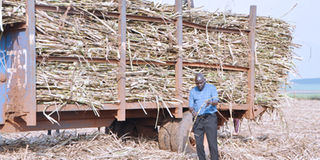How Aliira turns NSSF benefits into green gold

Simon Aliira at a sugarcane farm in Masindi district. He invested his age benefits from NSSF in sugarcane growing. Photo by Eronie Kamukama
Approximately 20 kilometres from Masindi town, cane plantations grow out of red soils. On some farms, green leaves wave as the lake would on any cold evening and on others, golden grasses lay on the ground lifeless. Traditionally, farms like these have attracted workers from all over Uganda. One such young man was Mr Simon Aliira Lulu, born and raised in Adjumani district.
By October 1993, he was ready to take up a job supervising the production and harvesting of cane for Kinyara Sugar Works Limited. The hardest time of his life then, was salary day because he would have to put it against a long list of needs.
Quitting employment
After dedicating 19 years to the sugar manufacturer, he felt if he were to relive those years, he would summon strength to be his own employer.
“That is exactly how I felt when I first came out. But then, I was trying to build a financial muscle because then without that money, I could not be who I am today,” Mr Aliira says as we move through cane fields.
The money he makes reference to is his retirement package from National Social Security Fund (NSSF). He had contributed five per cent of his gross salary. His employer, 10 per cent. Nine years ago, after he cleaned out his office, the human resource manager handed him a letter to enable him claim his benefits from the fund’s branch in Masindi.
“I filled a form at NSSF and was given a card to present at my next appointment after two months. In less than two months, I received a text message showing Shs85m had been deposited in my account. I was very excited and called an emergency meeting with my family to discuss how best to utilise the funds,” Mr Aliira narrates.
Investment choices
There was building a house and buying a car but these would not bear returns. The family decided and when their secret idea was no longer theirs to keep, they were instead added onto the list of sugarcane growers for Kinyara. About 64.8 hectares of land was leased and 23 others purchased to start farming.
“Kinyara gives you a contract, assistance in form of seed cane and money in form of fertiliser if you are short on funds,” Mr Aliira says.
“I planted in 2013 and the first harvest was 18 months later. From there, I realised Shs250m that went into my account in 2015. In 2016, I got Shs220m.”
The 62-year-old has been ensuring his crop performs, with a yield of 90 per cent. It has taken available finances for timely weeding, fertiliser application and vermin control. It has also taken a bit of mechanisation with each acre ploughed costing up to Shs120,000.
Challenges
Following this yield, that is also the way he has managed to kick poverty and illiteracy from his household. He also employs 80 casual labourers whose loyalty he has worked on in order to earn. A key breakthrough has been purchasing 44 hectares of land.
Mr Aliira loves the idea of cane growing like he loves himself. But he tells of another story when he has to pick up a phone call while these grasses turn gold particularly between December and March.
“In the dry season, there is no sleeping. You do not want to hear your phone ring because they will say your cane is on fire. It can be accidental, could be another farmer burning bushes but hunters also use it to attract animals. I have lost 24 hectares of cane before, the average is 80 tonnes per hectare and the price was Shs128,318 per tonne,” Mr Aliira explains.
In between, he has had to deal with land owners who breach leasing contracts. When his cane gets to market in some seasons, its price is affected by illicit sugar imports.
Impressive earnings
Despite these issues, he still earns an impressive profit. “When all deductions are made, I get an average of Shs3m to Shs4m per hectare. I have cane on 90 hectares. I save a third of my profits and plough back the other into the fields,” Mr Aliira says.
“Last financial year, I earned Shs723m. After costs, I remained with Shs303m.”
With such returns, he is convinced he has more work cut out for him on the farm. The ready market (Kinyara) is his biggest motivator. He expects to harvest 80,000 tonnes of cane next year.
His 44 hectares of land will be readied for tilling at the end of 2019. However, the farm is no place to seek refuge as you get older. Supervision gets tedious so there is another plan to either buy land and set up apartments for rent or buy existing rental houses.
So far, there is no freedom Mr Aliira has known better than after retirement. It is best enjoyed after building a business like his, a business one already has practical knowledge in.
This new found freedom interested him in applying for voluntary savings months after hearing announcements on the local radio. It has been more than two years now and the account is already exciting.
He views the NSSF Friends with Benefits contest as a chance to account for the retirement benefits he received but also to inspire younger generations to save for investment in life after work.
“When I assess, my life is much better than when I was working and that makes me stand out,” he says.
To vote for Simon Aliira in the NSSF Friends with Benefits competition, dial *254# or go to www.nssfug.org”




